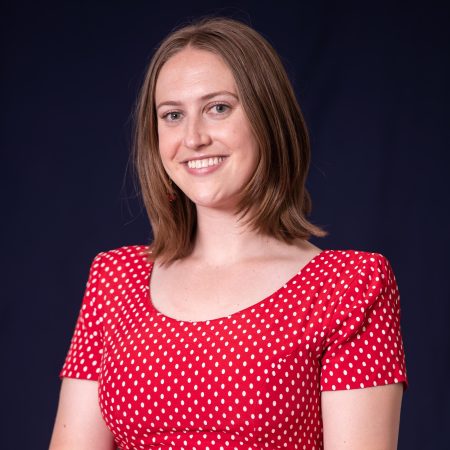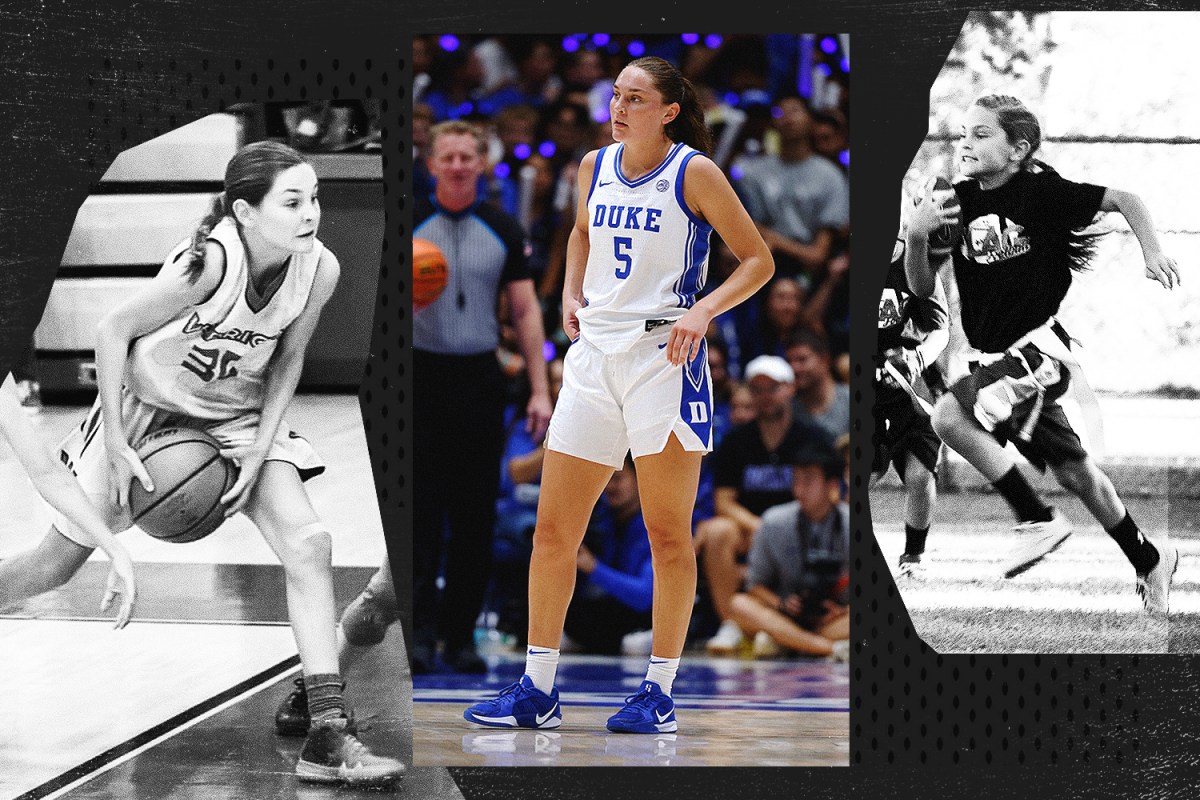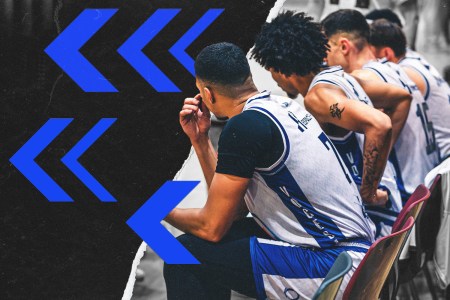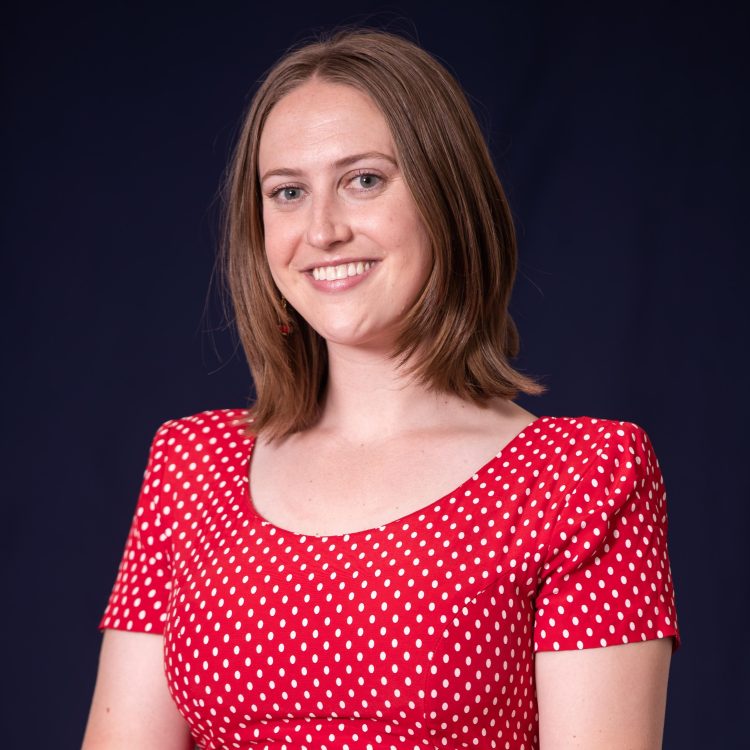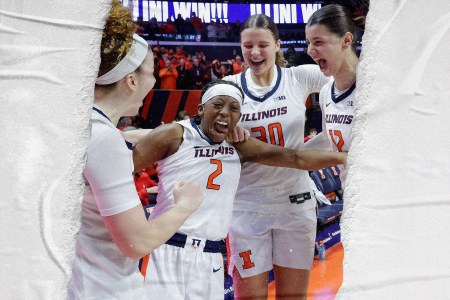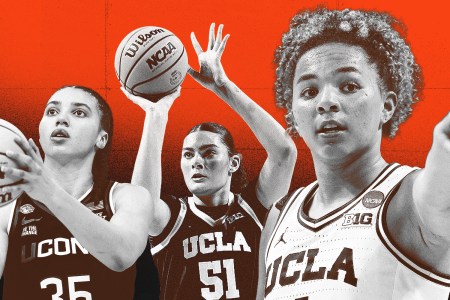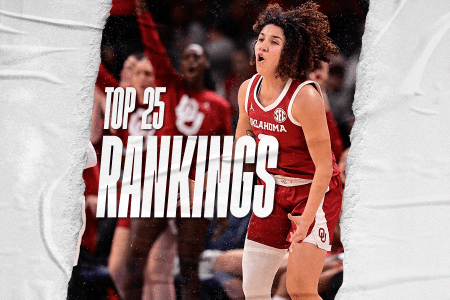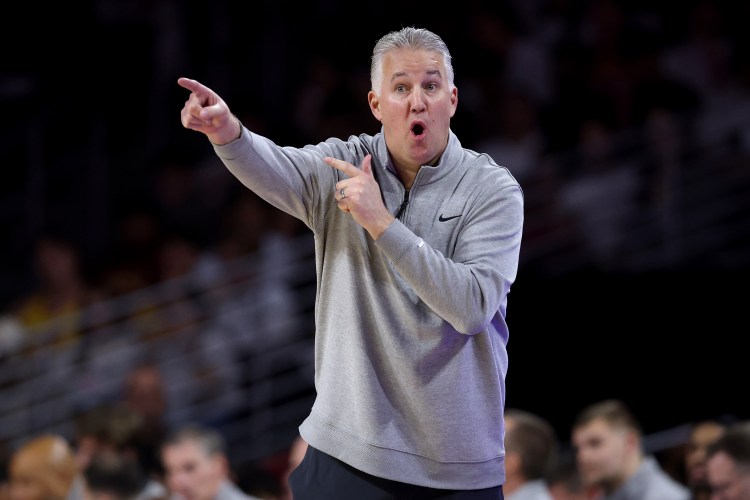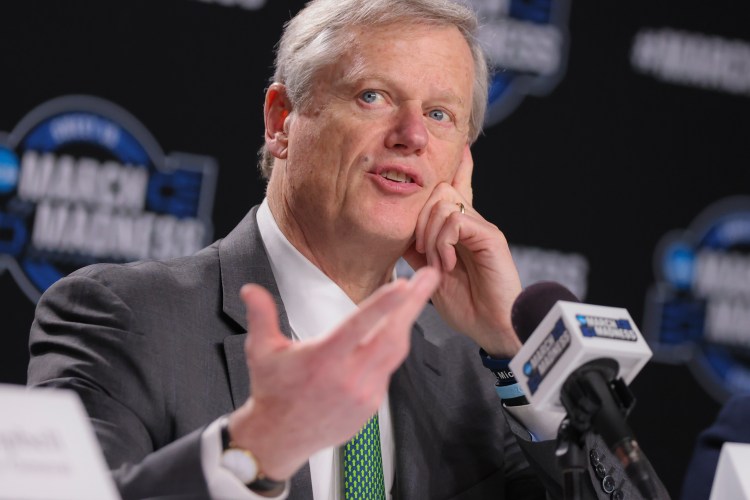Herschel Bird situates himself in a seat with a clear view of the stage.
His daughter, legendary basketball player Sue Bird, is being inducted into the Naismith Basketball Hall of Fame, and soon, she will be up there, giving a speech. Moments later, her former coach, Geno Auriemma sits down next to him. They exchange pleasantries before Auriemma brings up what Herschel really wants to talk about. His favorite basketball player. And it’s not the woman about to walk on stage.
Her name is Emilee Skinner, and anyone who knows Herschel knows he’s her biggest fan.
The two have only spoken a handful of times – he doesn’t feel the need to insert himself in her life. “She doesn’t need that,” he says. But he does feel the need to hype her up.
“Kids deserve to know when they are great,” Herschel says. And ever since he saw Emilee play in a Las Vegas Tournament during her junior year of high school, Herschel has made it his mission to let everyone else know how great she is, too. During that same Hall of Fame ceremony, Herschel tracked down ESPN announcer Ryan Ruocco, who will call some of Emilee’s games this season to give him a primer on the freshman point guard. He has yet to chat with NBA commissioner and Duke alum Adam Silver – who happens to be good friends with both of his daughters – but eventually, Herschel says he’d like to tell him about Emilee too.
Herschel likes to be right. He also likes to be first. He’s been involved in horse racing for 50 years, and he sees identifying talented basketball players the same way he views finding horses with potential. When they’re young, you can see a little something; maybe it’s a flash or maybe it’s obvious. But you never know exactly what they will grow into. So you have to be confident. You have to stake your claim and say, “This one is special.”
Herschel couldn’t see that in his own daughter when she was coming out of Christ the King and heading to UConn. “I was too close,” he says. But he sees it in Skinner. “I’ve always been fascinated by seeing things before they’re great. I often wonder, if you heard a hit song that no one had ever heard before, would you know it was going to be a hit?”
Skinner is his hit song. His race horse. His chance to follow a player from the beginning now that he’s watching his daughter at the end.
“Emilee has a gift,” he says. “She has a chance to be really special.”
Skinner is not unknown. She’s the No. 4 freshman in the country and a McDonald’s All-American heading into her debut season at Duke. But there is still a bit of mystery surrounding the 6-foot point guard. If you look up any recruit in the top 25, you’ll find multiple highlight reels. But none exist for Skinner, other than a 37-second clip of her saving the ball and making a behind-the-back pass to UCLA’s Sienna Betts in the McDonald’s All-American game.
“You can’t make a player out of a play,” Herschel says, “But that play really highlights what she brings. “Her length, her speed, her quickness, her presence of mind, her court awareness.”
That play was the first time a national audience got to see what Skinner was made of. Being from Utah added a challenge to her recruiting journey. It’s not a state known for producing high-level women’s basketball players: The short list includes former UCLA basketball player Natalie Williams (1990-94) and current Texas player Teya Sidberry, who is the state’s all-time leading scorer. Skinner finished with 2,313 career points, the fourth-most in Utah high-school history. But once you see Skinner play, even for just 37 seconds, it’s easy to see what Herschel saw. What Duke saw and what other top programs like Notre Dame, TCU, Iowa and UCLA saw when they recruited her.
To Skinner, it didn’t matter that she had to work harder to be noticed. Hard work has always been her speciality. “I remember waking up in the middle of the night sometimes to five-year-old Emilee doing pushups by the side of my bed,” her mom, Deana Skinner says with a laugh. “She was that kind of kid, with that kind of work ethic. And she’s still such a hard worker.”
Typically, players start being noticed in sixth or seventh grade. By eighth grade, coaches and scouts start to really analyze their skills, and it’s not uncommon for middle schoolers to receive college offers. By ninth grade, official evaluations begin.
But Skinner wasn’t on anybody’s radar at that point. Not even Herschel can say he knew her as a freshman in high school. Only her father Erik Skinner – a former college basketball player and current college golf coach – knew what was coming. “Somebody asked me at the beginning of her freshman year, if I thought she would start the next year,” Erik recalls. “I told him, ‘Emilee is going to be the best player in the state of Utah this year.”
Debbie Antonelli: How to Save the Walk-On Role
College basketball’s original Cinderellas are in desperate need of saving. At it will take is a tweak to the NET and a reminder that walk-ons are the game in its purest form.
Skinner led Ridgeline High School to a state title game as a freshman, averaging 18.3 points, 6.8 rebounds, 3.4 assists and 3.8 steals per game that season.
“I knew then that she was going to end up being a high-level recruit,” Erik says.
But Emilee didn’t even know if she would be a basketball player. As a kid, she always had some kind of ball in her hands. Her parents met at Eastern Arizona College, where Erik played basketball and Deana played volleyball, and her two brothers both gravitate toward golf. But Deana didn’t want to put her in a box, just because the rest of the family loved sports. She gifted her little girl dolls, only to see them collect dust. Once, Deana enrolled Emilee in a dance camp where she got to perform at halftime of a local basketball game. Emilee spent the whole routine glaring at her mother. When she was five, Deana finally found something that resonated with her daughter: A pink kitchen set. But it wasn’t the fake plastic food or the cute little utensils that Emilee liked, it was the fridge, which happened to be the perfect dimensions to store her basketball shoes. The kitchen set became a locker, and Deana stopped trying to introduce Emilee to non-athletic activities.
She played everything, from flag football to golf. And by her freshman year, Emilee was best categorized as an athlete, with soccer being her primary sport. She played for the Utah Avalanche, a club team that has produced countless NCAA stars and more than 25 players who have been called up to the USA senior national team. Skinner was so gifted on the pitch that when it started to become clear she was gravitating toward basketball, North Carolina’s soccer coach offered her a scholarship with the tantalizing promise that if it was OK with basketball coach Courtney Banghart, she could play both sports.

“For a long time we thought she was going to be a soccer player,” Erik says. “But things change.”
They changed dramatically for Emilee during her sophomore year, or rather, during a single weekend.
Emilee made her AAU debut during her freshman year. She only participated in two events because of her commitment to the Utah Avalanche, but the next season she played in her first major tournament: The Heart of Texas Showcase.
When she got to Texas, Emilee was an unranked recruit. By the time she left, she had been named the tournament’s most valuable player and rose into the top 25. Her first college offer came that weekend, from Utah Tech. By the time she got back to Utah, Emilee had double-digit offers and started fielding calls from power four coaches.
It was a whirlwind, and not necessarily a good one. Emilee has never liked the limelight, but knew she had to step into it in order to earn a basketball scholarship. Now that she was visible, it was a bit overwhelming. “She’s always been one to want to play the correct way, take the right shots, be the team player,” Deana says. “So it’s almost like she felt like, ‘Oh, I have all of this pressure now to be perfect because all these people are watching me.’”
Suddenly, being shielded by the anonymity of Utah was a good thing. At one point, before her stock took off, Emilee casually brought up the idea of leaving her hometown. Plenty of prep schools would have loved to have her, and it would have been better for exposure, better for basketball. Just maybe not better for Emilee.
Almost as soon as she brought it up, Emilee squashed her own idea.
“I just enjoyed being in my hometown,” she says. “I had a lot of good resources there and I wanted to be around my friends and my family. So ultimately, I didn’t see a reason to leave because I was in such a good spot.”
Now, after suddenly shooting to stardom in Texas, Providence Utah, a city with a population under 10,000, was the perfect place for her to be. Emilee ended up winning three straight state titles in high school. Ridgeline was so dominant that the River Hawks had to start going to out-of-state tournaments in places like Arizona and Nevada just to find opponents that could challenge them.
“It was good for us to get out so people could see the talent we had,” Emilee says. “And I tried to do my part with putting Utah on the map. There haven’t been a ton of players that have come out of Utah, but there is a lot of talent there, and the basketball is very good.”
It was at one of those tournaments, the Tarkanian Classic in Las Vegas, where Herschel Bird first watched Emilee play. Emilee didn’t notice him that day. Like her, Herschel doesn’t crave the limelight. He just loves basketball. “He kind of sits alone and is very quiet,” Emilee says. “But he’s a super nice guy who knows basketball. I mean he watched his daughter grow up to play at the highest level.”
The three of them make up a convoluted full-circle moment. Herschel watched Sue grow up, then once she was grown, Emilee watched her and idolized her game. Now, Herschel watches Emilee with the same reverence she felt about Sue. And though Herschel doesn’t see their games as being similar, Sue Bird is the most common player comparison Emilee gets. A lot of that comes from the way they visualize the game. Both have a true point guard’s eye, predicting and dictating plays long before they happen.
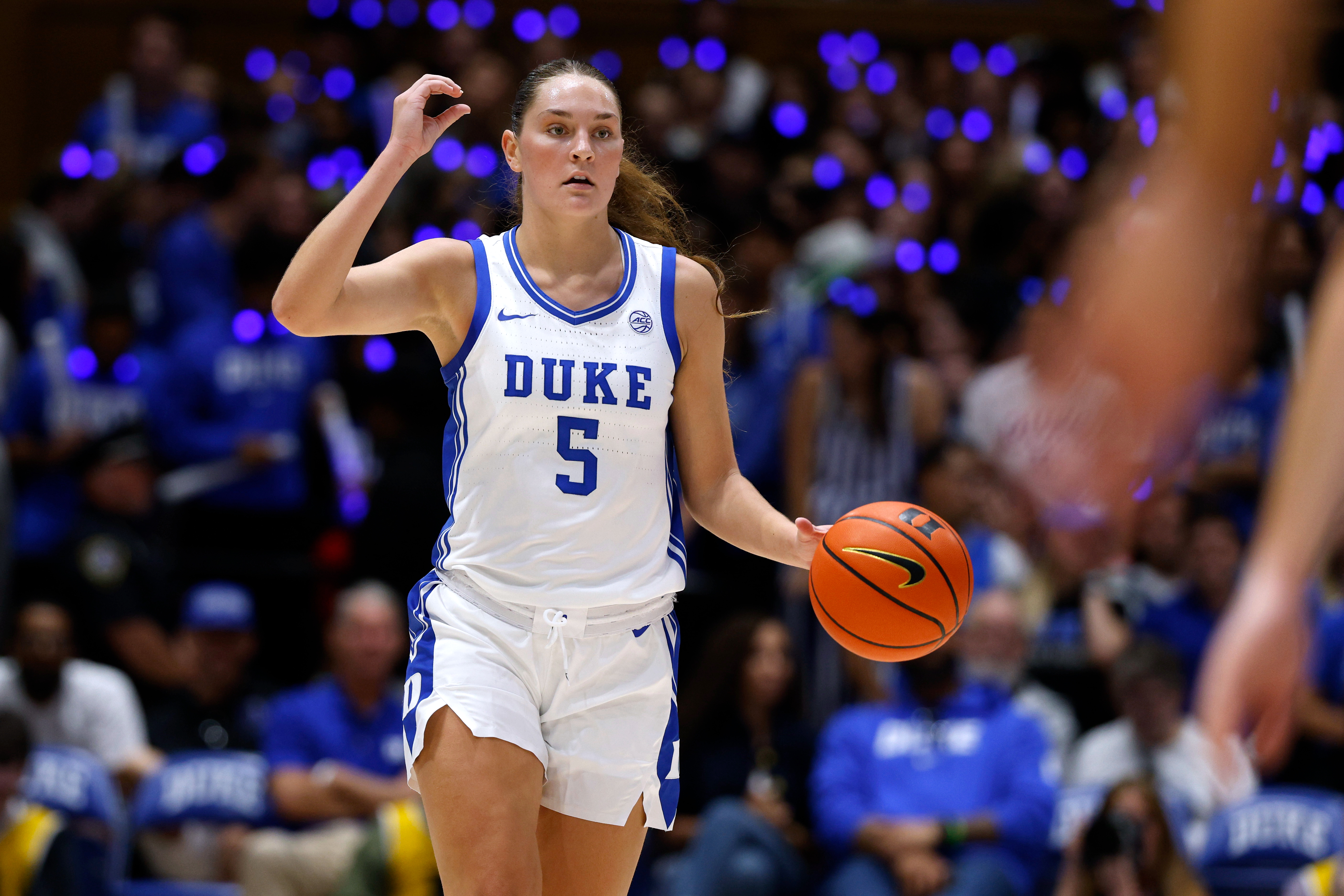
For Emilee, that’s just how she sees the world. When she wasn’t doing pushups by her mom’s bedside, or organizing her kitchen locker, Emilee was asking questions. When she watched sports with her dad, be it basketball, football or whatever else was on, Emilee always wanted to know why things happened. She’s the same way with her teammates and coaches. Curiosity, Emilee, believes is the foundation for chemistry.
“She wants to know about you as a person,” Duke assistant coach Pierre Miller says. “The more you understand people, the more you can communicate with them in honest ways, and then that makes it easier to help them figure out difficult situations, on and off the court.”
Miller, a former point guard at Presbyterian from 2007-2012, knows almost everything there is to know about running an offense. But working with Emilee has infused him with some of her trademark curiosity, allowing the longtime coach to see the game through a new lens. “We will watch film together and then she will go onto the court and do something completely on her own,” Miller says. “She will make a decision that I didn’t even know could be made until she made it.”
Playing basketball with Emilee is like bringing in a new detective to help solve a cold case. Suddenly, everyone is seeing things with fresh eyes. Even the way she warms up seems novel. “I’ve never seen a freshman dribble with that type of intensity,” Miller says. “I’ve never seen a player that young dribble the basketball that hard, and have the ball on a string the way she has it on string.”
Twice this summer Miller has watched Blue Devils scrimmages come down to the last possession. And both times he’s seen Emilee take – and make – a last second shot. That, he says, revealed her clutch gene. During another practice, Emilee showed off her defensive prowess when one of the male practice players beat her off the dribble for what looked like an open layup. Instead, Emilee used her length to block his attempt off the backboard. It was so impressive for Emilee and so embarrassing for the practice player that Miller jokingly refuses to reveal his name.
It’s like Herschel says: “You can’t make a player out of one play,” but you can start to paint a picture. And Emilee looks like a masterpiece in the making.
It wasn’t the clutch factor or a film session or even an embarrassingly good block that made Herschel believe in Emilee. It was a simple test that he says likens her to players like Courtney Vandersloot, Lindsay Whalen and Alyssa Thomas.
“When you watch a game, you’ll see a player go down, OK? They get hurt in the middle of a play or whatever,” he says. “You’ll see the other nine players go up the court to the other side, and they play as if that player is still playing. They don’t adjust. But players that have that gift, they know right away.
“Emilee has that gift. She sees everything.”
You know who else had that gift? Sue Bird.
Emilee finally got to meet her in late September, when Duke coach Kara Lawson was named the head coach of the USA Women’s Basketball team. Sue serves as the team’s managing director, so she came to Duke’s campus for the announcement. After working up the courage to approach Sue, Emilee realized she didn’t know how to introduce herself. “I just said, ‘I know your dad.’
“I know,” Sue said with a smile. “He’s told me all about you.”
